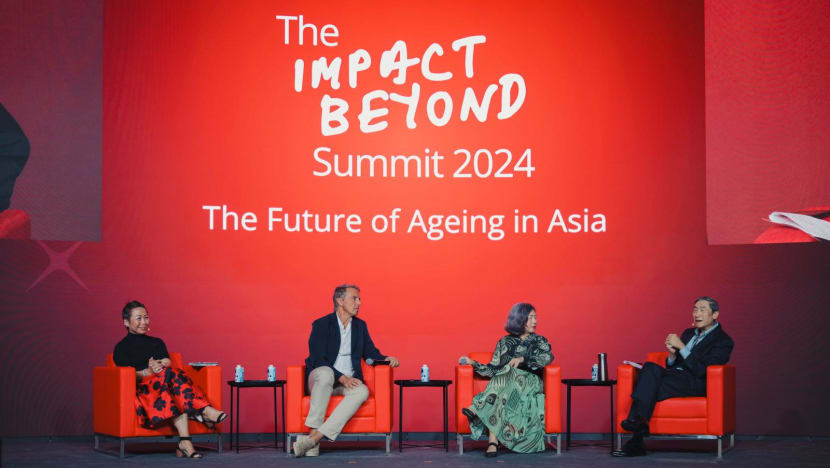Value in retaining older employees, but stereotypes need to be changed, say panellists at DBS summit

(From left) Ms Karen Ngui, managing director and head of DBS Foundation and DBS Group strategic marketing and communications, author and researcher Dan Buettner, Mediacorp CEO Tham Loke Kheng and Professor John Wong, executive director of the National University of Singapore’s Centre for Population Health, at the DBS Foundation's Impact Beyond Summit on Nov 11, 2024. (Photo: DBS Foundation)

This audio is generated by an AI tool.
SINGAPORE: More needs to be done to support older employees in Singapore, amid a culture of ageism and the stereotyping of such workers, said panellists at a DBS Foundation summit on Monday (Nov 11).
“Ageism is rampant and we cannot associate someone’s ability just by age,” said Professor John Wong, executive director of the National University of Singapore’s Centre for Population Health.
A panellist at DBS Foundation's Impact Beyond Summit, Prof Wong said older employees should not let their age curtail their ability to work, and employers should not link an employee’s value to their age.
“We must say '60, so what?' Age is just a number,” Prof Wong said during a plenary discussion on challenging the stereotypes of growing old.
The inaugural summit, which welcomed around 300 attendees, brought together policymakers, industry leaders, businesses and community partners to discuss the problem of ageing and redefining the ageing narrative.
By 2030, around one in every four Singaporeans will be aged 65 or above, an increase from one in 10 in 2010, according to the Ministry of Health (MOH).
Singapore’s minimum retirement age is 63, but will be raised to 64 from Jul 1, 2026. This will apply to those born on or after Jul 1, 1963.
Prof Wong said many older employees in their 60s are still able to contribute greatly to society.
Referencing an article in the 2016 edition of The Journal Of The Economics Of Ageing, which explored the productivity levels of older workers in a Mercedes-Benz factory in Germany, Prof Wong said the study found that productivity did not decline among these workers and they made fewer mistakes.
“There is no age limit in productivity, and it's mainly because older people make less serious errors,” he said.
Mediacorp CEO Tham Loke Kheng, also a panellist, agreed with Prof Wong, saying that more than 20 per cent of the company’s employees are 50 years old and above.
“We see the value in what our older workers bring to the workplace. The work for us now is on how to change the narrative and how to break the stereotypes that are still there,” Ms Tham said.
She added that ageing in Singapore is still greatly associated with decline, a decrease in independence, and being narrow-minded.
“The stereotypes are still very much there. There’s a lot more we can harness in supporting the workforce in terms of caregiving, mentoring, social and community.”
Prof Wong emphasised that more needs to be done to help older employees feel valued in the workforce.
“There’s no point raising (the) retirement age if people leave the workforce at 40 to 50 (years old). So we need to do everything to prevent people from leaving the workforce. Women are leaving the workforce in their 40s because of childcare and parent care.
“And men are leaving the workforce in their 50s because of technology. They’re all of a sudden becoming redundant,” he added.
It also should not be entirely up to the government to find career opportunities for older workers, and the community also needs to do their part, Prof Wong said.
“It has to be co-produced and co-designed, because if we don’t do it, it won’t be scalable or sustainable.”
In January 2023, MOH updated its Action Plan for Successful Ageing which aims to address the changing needs of current and future seniors. Increasing the number of active ageing centres and improving support for dementia patients and their caregivers were among the initiatives introduced.
Speaking in the same plenary discussion was author and researcher Dan Buettner, who first coined the term "Blue Zones", regions where people live longer and lead healthier lives.
Mr Buetter spoke about how leadership is important in pursuing policies that will favour a country’s well-being.
"I think for most countries, there is an economic priority without a clear agenda to fold in well-being," he said.
The panel was moderated by Ms Karen Ngui, managing director and head of DBS Foundation and DBS Group strategic marketing and communications.
Other panellists who spoke at the summit included Mr Nathaniel Farouz, managing director of senior living at Keppel, and Dr Mary Ann Tsao, chairman and founding director of the Tsao Foundation.
Singapore's President Tharman Shanmugaratnam and DBS' outgoing CEO Piyush Gupta also took part in a fireside chat that was not open to the media.
DBS Foundation also announced on Monday that it will invest S$88 million (US$66.1 million) to better support vulnerable communities. The funding will go towards initiatives to improve the "living spans" of the ageing societies across the region.
There will be a total of 15 initiatives, with nine focusing on access to essential needs such as healthcare, basic education and food security, while the other six look at building financial knowledge and digital literacy to boost employability.
















